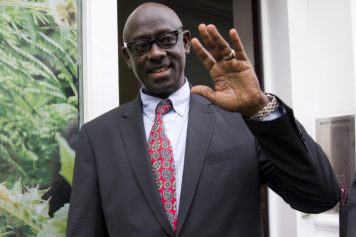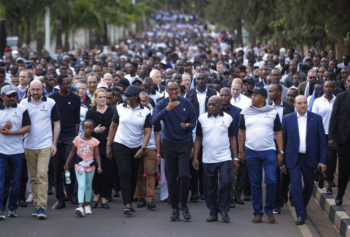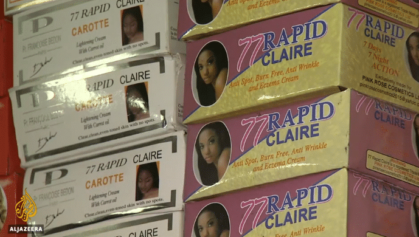As the M23 rebels in the Democratic Republic of Congo and the Congolese government try to sit down and work out their differences, attention must be paid to the state of the refugees in the DRC who live their lives in a perpetual state of disarray.
After the latest round of conflict, during which the M23 rebels took the city of Goma and then agreed to retreat, the number of displaced people in the province of North Kivu grew from half a million to more than 800,000 people, the charity Medecins Sans Frontieres (MSF) told the BBC.
The charity said the refugees lacked shelter and other essential items—many had just fled another displacement camp, yet another move to mirror many others they have had to make. It is instructive to envision the lives these nearly a million people—many of them women and children—must lead, living in squalor, their daily existence largely dictated by the elements and the amount of food they are able to find, their children aimless, with no access to regular schooling or recreation enjoyed by small children across the world. This life is especially painful for the Congo’s women, vulnerable and living in a place that the UN has called “the rape capital of the world.”
It is a heartbreaking existence.
DRC President Joseph Kabila made an address to his nation’s Parliament during which he said he was about embark on an initiative that he said would unite his country.
“National cohesion must not be conditional, it must be open for all,” Kabila said in his speech. “An initiative will be taken shortly, the details to be decided in due course. There should not be a Congo for the majority and a separate one for the opposition.”
Kabila doesn’t often address his countryman. He is a deeply unpopular figure, seen as weak—particularly after the M23 rebels took Goma with no resistance from Kabila’s military force, who actually ran as the rebels rode into town—and the recipient of a fraudulent 2011 election.
When the M23 rebels rode into Goma, an important population and economic center with a million people, the Congolese army actually ran away and about 1,500 UN peacekeepers didn’t lift a finger to stop the rebels. This has led to a review of the
The United Nations launched a review by the UN of its biggest and most expensive peacekeeping mission, called MONUSCO. and Kabila said he was disappointed by the lack of resistance to M23.
“The limits of the approach of MONUSCO were a disappointment to the government and to the people,” Kabila said. “We have asked for a strengthening of its mandate. We will also accelerate the pace of improving the capacity of the army.”
Meanwhile, many experts are wondering why M23 agreed to withdraw from Goma when it had already captured the city and was pledging to take other cities in the mineral rich nation. Though both Rwanda and Uganda have repeatedly denied involvement in the M23 uprising, experts are fingering the severe financial sanctions countries like Britain threatened to impose on Rwanda as the reason for the withdrawal—proving that Rwanda has a direct line to the M23 rebels and ordered them to pull back.
The experts have contended that Rwanda, much more stable and orderly with a tough and disciplined army, is backing the rebels as a way of gaining control of the mineral-rich eastern region—a region whose minerals Rwanda has dipped into for years, helped by the rebel groups in a underground black market. Observers say it is Kabila’s efforts to stop Rwanda and shut down this black market that is the real trigger for the M23 uprising.
It is a basic tenet of journalism (and of life): If you want to know the real story, follow the money.
The conflict also has roots in the genocide that took place in neighboring Rwanda 18 years ago, when the Tutsi ethnic group was almost extinguished in a chilling massacre by the Hutus. Now the Tutsis have re-emerged in the form of these new rebels, called the M23, who are made up almost exclusively of Tutsis. Rwandan President Paul Kagame is also a Tutsi. More than 2 million Hutus fled Rwanda into the Congo after the genocide, fearing the new Tutsi-led government would be intent on revenge.
“The withdrawal [of M23 from Goma] seems like it had something to do with international pressure on Rwanda and Uganda,” Ida Sawyer of Human Rights Watch told writer Peter Jones in a piece on allafrica.com.
“In the week of M23’s withdrawal, rumours were circulating around Goma that Justine Greening, the British Secretary of State for International Development, would freeze a tranche of aid to Rwanda due to Kigali’s links to M23. On November 30, while the withdrawal was still being negotiated and Makenga (rebel leader) was yet to fully agree to the terms of the rebels’ departure, the UK confirmed the £21 million ($34 million) aid freeze. The next day, M23 was gone,” Jones wrote.
Since it was colonized by Belgium in 1908, the Congo has been victimized by its beauty and its richness of minerals, as it is a prize sought by many. The Belgians brutalized the population in order to extract as much rubber and ivory as possible and over the last several decades rebels from inside and other African armies from outside have pushed aside the weak government to take enormous tracts of territory rich in copper, timber, diamonds and gold.


